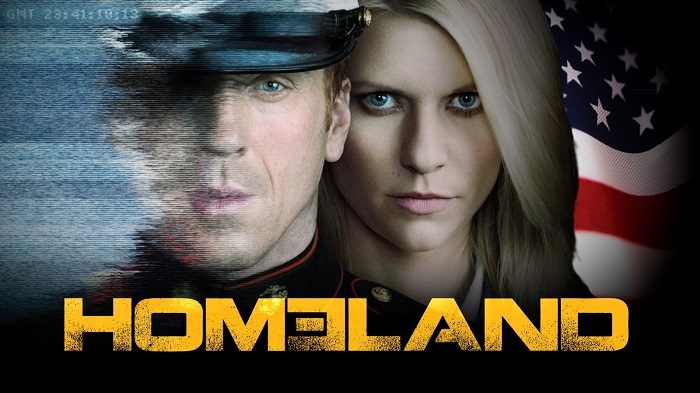
October represented another high point in the popular culture-world politics continuum spectrum. Following the airing of a recent episode of the Emmy award-winning Showtime series Homeland (2011- ), based on a Israeli thriller called Hatufim (‘Prisoners of War’), the producers admitted that the ‘Arab graffiti artists’ it had employed to lend ‘authenticity’ to a Beirut cityscape (filmed in Germany) shaped by the presence of Syrian refugees had used the opportunity to tune up Homeland as a racist and xenophobic blight on the West’s geographical imagination of the Islamo-Arab world. Tasked with marking up the walls of a set in a Berlin exurb with Arabic-language graffiti, artists Heba Amin, Caram Kapp, and ‘Stone’—who ended up being committed activists—used their access to a global media product to highlight the show’s depiction of Arabs as surreptitious and incorrigible terrorists, transgressively performing a sort of contratextual reading of the series through interstitial text and marginalia that would have made Edward Said proud. The hand-writing was literally on the wall in this case: ‘Homeland is racist‘, ‘Homeland is a joke, and didn’t make us laugh’, and most perplexing to a culturally-tone deaf audience, ‘Homeland is a watermelon’ (sadly, this rather easy to tease out metaphor – assuming one does not have even basic intercultural competence – seems to have become a reason to demean its creators).
While right-wing pundits gleeful glommed onto the story in a guilt-free and unreflective bemoaning of the evils of political correctness (lounging in the umbra of Donald Trump’s ceaseless diatribes against any systemic form of respect for our fellow human beings, particularly those who are not white, male, and filthy rich), the main stream media has instead decided to chastise the structural weaknesses of contemporary Anglophone televisual production. Shows like Homeland seek to replicate or even exceed the gravitas of filmic production, yet they are driven by the predictable and prosaic cost restrictions associated with any TV series. For most journalists, this was just an example of not paying attention. Let’s have a laugh at Homeland for its failure in oversight and move on. Both of these camps are missing the bigger picture.
Activists who are living with the deleterious outcomes of the prejudices they feel come (at least partly) from globalized mediated representation that emanates from a recondite marriage between the Pentagon and Hollywood found their voice and delivered some much needed payback. Combining new and old media, popular geopolitical TV got punked by popular geopolitical pop-art with a pedigree that predates pixels by at least 2,000 years (we know the Romans were doing it in Caesar’s day). What does it all mean? This is the consummate question that we ask ourselves when we, as IR specialists, delve into the PWPC continuum. Frankly, I’m not comfortable providing an answer at this junction and that is why I was compelled to write this particular blog post. I know that this is a transformative as well as subversive act, one which represents nothing more or less than the beginning of a swelling tidal wave that will transform the popular discourses of power and privilege in the decades that will come.
This act is a physical realization that the pop-culture canvas is not just palimpsest to be altered after the artist finishes the painting, it can be subverted even in the process. Evidently, the ‘Europeanized’ Arabs employed by Homeland to inject a bit of the ‘real’ into the fake of their geopolitical imaginary backfired, or did it? Homeland, like its Israeli predecessor, has always been about asking and answering disturbing questions associated with identity, otherness, and securitization in times of terror. Call me a conspiracy theorist but the ‘revelation’ that a handful of ideologically driven Muslims has interrupted the geopolitical messaging of a reliably statist treatment of the unending ‘War on Terror’ seems a bit too convenient for me.
While I do not doubt that the young artists who used their one-time enviable position as ‘Arabs in Germany’ to make a difference, it is also plausible that producers were completely aware of the geopolitical prank and sweatily anticipating being ‘embarrassed’ by their own ‘oversight’. If one looks back at the big budget Hollywood films that have ‘offended’ folks overseas (The Interview, Borat, 300, Hostel, etc.), there is always a silver lining (or to update the metaphor, I should say a ‘green’ one, i.e. higher revenues). Cultural producers in the West are increasingly courting controversy as they engage political subjects associated with international affairs as there is little downside (excepting the pro-North Korean hack of Sony, of course). Many see this phenomenon as a new form of propaganda, but that is a bit facile. In the past, no propagandist ever worried about profits other than those of an ideological nature. In the contemporary neoliberal milieu, return on investment matters. Consequently, a show like Homeland might just be showing us the bleeding edge of what is in store for us as we embark on our collective popular-geopolitical future.
Further Reading on E-International Relations
- Future of Popular Geopolitics: Croatia, Affective Nationalism and the World Cup
- The Future of Popular Geopolitics: Zombie Evolution and the Return to the Social
- The Future of Popular Geopolitics: Mega-Shark Cinematic Diplomacy
- The Diplomat: Gender and Security in Popular Culture
- Devouring Brazilian Modernism: The Rise of Contemporary Indigenous Art
- Sensible Politics: Expanding from Visual IR to Multisensory Politics